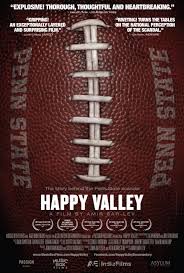When I was researching Happy Valley online after watching the film in class, I came upon an OnwardState article reviewing the faults in the film. The article was titled “Five Reasons Why the ‘Happy Valley’ Documentary Sucks” clearly expressing the opinion of the author, as if the bias wasn’t already apparent enough due to it being written by a Penn State student. After reading through the article, I found on some points the author had made a somewhat valid point but others were either completely false or the clear bias the author had interfered with the message the film was trying to send.
The authors first point is that: The film fails to explore, or even mention, any of the ambiguity surrounding the key facts of the case. He then goes on to explain how the film doesn’t spend enough time addressing the events that happened in 2001, failed to accurately depict the Penn State environment, and the belief in the Penn State community that there was no institutional coverup. In this section, I can see a lot of what the author is saying, as in a lot of the scenes (especially in the riot and crowd scene) Penn Staters are shown as cult-like and senseless. I disagree though, that the events of 2001 were not covered enough. In my opinion, the film was more about the reaction of the community and impact on the community than solely covering the events in the Jerry Sandusky case.
Secondly, the author states:The film only included interview clips from one student, who came off as crazy and isn’t at all representative of what most (or really, any other) students were feeling. As discussed in class, the director deliberately chose this student as to show the extreme view point for most people who were more uncertain or in the middle with their viewpoints would be less expressive. I also thought that the use of extreme characters in the film, allowed for no one viewpoint to be portrayed as more strong than the other; thus allowing the audience to decide for themselves what they thought.
Next, he claimed: The film fails to disclose its subjects’ biases, and the interviewees most critical of the “Penn State culture” are presented without any sort of critical eye. In this section he refers to Andrew Shubin who was the attorney for many of Sandusky’s victims and believes that the film failed to show that this bias impacted his statements in the film. I’m pretty sure that in the film it was stated that he was representing some of the victims, but nevertheless some of his statements I did find false such as that everyone was aware of the situation with Sandusky. As a student not very interested in sports, I don’t even know any of the players names so I can’t imagine that many people knew who the assistant couch was off the top of their head. In this section, the author also critiqued Matt Sandusky’s point. After the film, Matt received a settlement from the University and some believe that his timeline doesn’t add up. I don’t think it is right to accuse a victim of sexual assault and say that their story is false and they are using it for money. As shown in the film, Matt lost both his biological and adopted family and its hard to believe that he would do this all simply for money.
The next point is:What is presented as a cross-section of the Penn State community isn’t really a cross-section at all. In this section he again points out how the film uses extreme viewpoints, which I have already expressed was used because these are the people that actually have opinions on the issue and would want to share. Similar to Stories We Tell, Happy Valley didn’t intend to portray one side of a story but rather get a wide variety of versions of the same story.
His final point is that: the Story isn’t Over. I believe that this is simply a result of time, either the filmmaker could have waited 10 more years and still not have potentially had all the facts or presented the film when he felt it was in its entirety.
A separate complaint I have of the film is that though it slightly addressed the idea that this wasn’t just a Penn State problem and that child sexual abusers can be anywhere, I don’t think it did enough to emphasize this idea. It constantly questioned how this could happen in a place like Penn State, but didn’t acknowledge that this abuse, sadly, happens everyday all over the country and goes largely unnoticed. Perhaps at the end of the film when Sue Paterno was trying to raise awareness more emphasis could have been placed on this fact. I believe this would have allowed the film to offer a greater social impact and not just a reflection on the situation at Penn State.
Source: http://onwardstate.com/2015/06/16/five-reasons-why-the-happy-valley-documentary-sucks/


